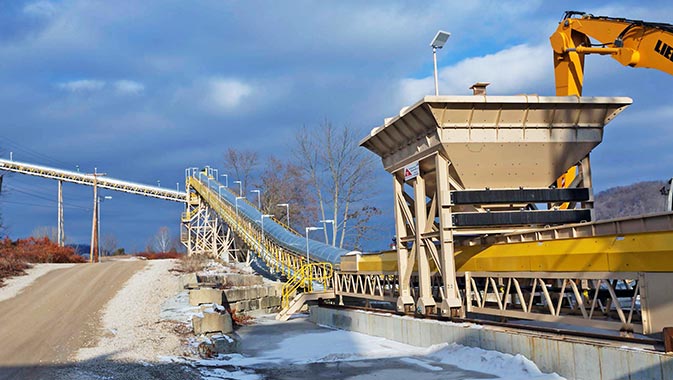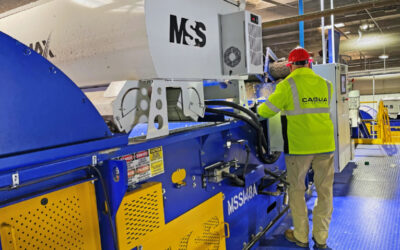Illinois-based TCI Manufacturing & Equipment Sales, Inc. proudly serves a range of sectors, including construction aggregates and the frac sand industry. TCI has the equipment and experience necessary to serve all aggregate industry customers. They constantly seek to grow and improve the company and introduce new products to the marketplace to meet customer demand.
~
Although created in 2000, the roots of TCI stretch back to the mid-eighties. It was at that time that Mike Maynard and Richard ‘Dick’ Nelson started a manufacturing company named Production Engineered Products (PEP), which successfully grew and became known among construction aggregate companies for its line of quality, patented High Frequency Screens, which are used for particle separation (i.e. 3/8” – 20 mesh ranges). Astec Industries acquired PEP in 1997, relocated to Sterling, IL and saw Maynard serve as president for three years. Soon after, Maynard and Nelson returned to Walnut, Illinois and establish TCI.
With formidable knowledge of the aggregate industry, TCI’s initial focus was on designing and manufacturing conveyors. The product line then expanded to include vibratory feeders, bins, hoppers, chassis, stationary screening plants and structures as well as getting back into producing the High Frequency Screen. Maynard expanded TCI’s reputation for quality, competitive pricing, safety and the ability to create innovative solutions for customers.
Dick Nelson had previously owned a couple of sand and gravel operations in Illinois and an asphalt paving company according to TCI’s General Manager Jack Ackerman, who has been with the company for seven years.
The company had a welding shop to take on building and repair projects for the sand, gravel and asphalt company and the idea arose of using it to manufacture high-frequency screens. With Nelson’s brother becoming involved in the business, they created their initial high-frequency screens to meet aggregate industry demand.
“They started building more of them, getting out into the field and selling them to other producers to the point where it was getting successful enough they could make a company out of it.” Soon, the company was selling high-frequency screens coast-to-coast. Today, TCI’s high-frequency screens represent about twelve percent of its business, with the rest being made up of conveyors, structures, hoppers and even complete plants for customers.
It has a full-time staff of sixty-five including shop workers, fabricators, welders, machine operators, painters, sales representatives, estimators, engineers and purchasing staff and TCI continues to expand its operations. From its base in Walnut in north-central Illinois, about one hundred miles west of Chicago, the company takes on projects for clients coast-to-coast. TCI also has dealers in Mexico and Canada and has shipped screens to Russia and conveyors to the Egyptian military, making the company truly international in scope.
“There is no limit to where we will go,” states Ackerman of the business, which is promoted through dealer networks worldwide. “Once you’re in the industry, you’re connected. You meet people, and connections go on. It’s all about relationships.”
TCI constantly innovates to provide the best quality products at a competitive price to ensure customer satisfaction. To match pace with the high demand, the company made a new building of 26,000 square feet in 2007 and another 34,000 square foot facility in 2012, with equipment that included CNC machines, a paint booth and overhead cranes. It has the capability to not only design, but precisely engineer and manufacture entire plants.
TCI continues to work with the aggregate industry – limestone quarries, sand and gravel operations – and has also seen a significant rise in the frac sand industry in the past three to four years, which, has been very good for business. Geographically positioned between some of the best sands in the world, TCI is regularly approached by silica sand companies to work on new projects, from design to engineering and manufacturing.
Among the company’s many products are radial stacking conveyors, manufactured with a variety features and in many sizes. Depending on customer need, TCI can provide diesel hydraulic radial stacking conveyors which are self-contained, road portable or stationary conveyors, mast-type stackers, floating conveyors, pedestal-style cantilever conveyors, barge-loading conveyors, and long overland conveyors in either truss or channel frame design.
The company is a firm believer in working with all clients in advance to determine their requirements, and fits a perfect niche in the industry by being large enough to tackle large projects, yet small and flexible enough to quickly react on the fly to take care of customer needs. No job is too big or too small for TCI. “We have a lot of dialogue with our customers to find out what their needs are,” says Ackerman. “We’ve got a really good engineering and design department that makes sales drawings, approval drawings or conceptual drawings, and we work with our customers to make sure we are all on the same page. Once it gets past that process, then we’ve got something to provide accurate pricing off of, oftentimes referring to past history to generate pricing.”
In this case, ‘past history’ means a massive database of all jobs undertaken by the company, including quotes, drawings and labor costs, which allows TCI to refer to past works for similarities when quoting a new project, be it a conveyor, a chassis, a structure, or a complete aggregate plant.
With products custom-made to order, there is still a need for a standard product line catering to the aggregate industry. To serve these clients, TCI has a separate part of the business catering to dealer networks that promote the standard product lines. These include high volume items such as portable aggregate equipment: conveyors, feed hoppers, chassis and screening plants.
The company has further plans to expand across the United States and Canada. Its goals include growing its dealer network and either adding to its existing facility or constructing additional space at another location. One location saw an addition in 2012 bringing TCI’s total facilities to 60,000 square feet of manufacturing and another 4,000 square feet of office space. Yet, TCI still needs more space.
“We are working on it right now,” comments Ackerman. “In fact, we are full. For the past several years, we have had record growth and capacity. We work three shifts right now as it is, so we’re looking at finding another facility.”
TCI is located in a rural farming community in north-central Illinois and hires local workers when possible. Realizing that a significant segment of the community calls the area home and has no plans to move away from family and friends, co-founder Mike Maynard decided to create job opportunities by starting a welding school. Working with the head of the company’s engineering and manufacturing departments, students come in three nights per week and learn everything from how to read a blueprint to safety, shop protocols, and how to handle tooling.
“We set up these learning booths, and they learn how to weld,” says Ackerman, his voice full of pride. “This goes on, and once they complete the course, they are either offered a job or they are put at the top of the list the next time there’s an opening. And we’ve had tremendous success with this.”
In the hands-on course, about three students are taken on at a time under supervision. The extremely successful welding school is greatly appreciated by locals who are looking for a career in the area.
“We figure if someone will leave his family three nights a week, come here, learn a trade, and has a good attitude and good attendance, we are sizing up that person as an employee. It is a good chance to train and help the local population out. It has really been a success, and we are very proud of that.”













